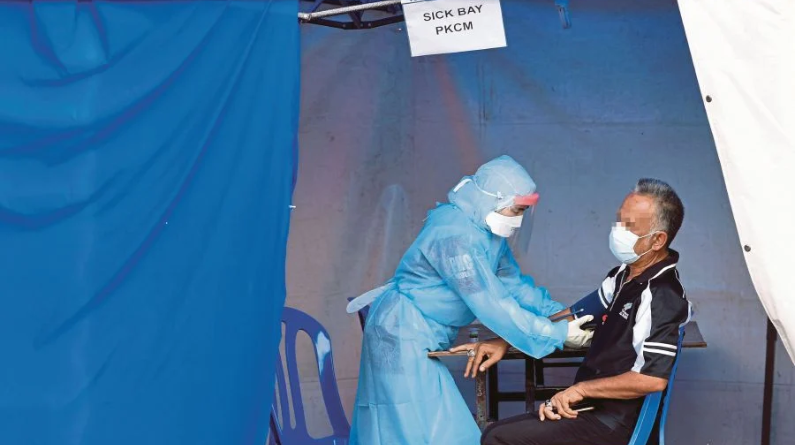Quarantine centres may reduce cases
KUALA LUMPUR: THE lowest number of local Covid-19 infections in two weeks, at two cases on Saturday, may turn into a consistent trend due to the government’s reinforcement of the mandatory quarantine at designated centres for new arrivals into Malaysia.
Epidemiologist Datuk Dr Awang Bulgiba Awang Mahmud said the development, while encouraging, should be followed up by continuous adherence to the standard operating procedures (SOP) to ensure that the numbers remained manageable.
“The mandatory quarantine at designated areas imposed by the government on Malaysian returnees and foreign arrivals should contribute to low local transmissions.
“This is provided that we isolate any home returnee who tests positive.
“Quarantine for returnees at designated centres restarted on July 24, but there were quite a number of people who were home-quarantined before that. Once the final batch of returnees undergoing home quarantine complete their 14-day isolation without problems, then we are less likely to see any local transmission from returnees.
“However, we must ensure that the SOP at quarantine centres is strictly followed. We should not repeat the mistakes made in Melbourne,” he said.
Asked whether the reinforcement of the mandatory quarantine could lead to even lower or possibly zero local transmissions, Awang said it would be difficult to achieve as the virus was circulating in the community and occasional cases might occur.
This was demonstrated by the Health Ministry’s announcement yesterday that 11 of the 14 new cases were local transmissions under the Sivagangga cluster from Kubang Pasu, Kedah.
The cluster involved a restaurant owner, a family member and four workers. To date, 313 people from the cluster had been screened, and 20 tested positive.
Awang added that as long as cases were isolated and treated, it would not overwhelm healthcare facilities.
People, he said, might have to accept that they would probably have to live with the virus for some time until a vaccine or treatment was found.
Awang said the government’s move to reimpose mandatory quarantine at government facilities or hotels instead of at home was the right one.
This, he said, was because some people might not fully understand the reasoning behind the move and what was required for it to be effective.
He said while the mandatory quarantine put a financial burden on the government as it bore 56 per cent of the costs for Malaysians, including the Covid-19 screening tests, the alternative was worse.
“If a super spreader who breaks home quarantine was to infect hundreds of people, the cost of contact tracing and isolating infected people would be astronomical.
“If cases rise exponentially, like in Melbourne, then another Movement Control Order, even one limited to certain areas, will cause a lot of economic hardship to people and the government.”
He said the government should continue using quarantine centres unless there was a total barring of entry into Malaysia or until infections in other countries were reduced to very low levels.
“There are not too many options on the table at the moment. In Hong Kong and Australia, we have seen how imported cases can cause a resurgence in local infections.”
Echoing Awang was fellow epidemiologist and biostatistics expert, Dr Malina Osman, who said Saturday’s local transmission number was positive and a reflection of the tightening of Covid-19 preventive measures, especially the mandatory quarantine at hotels and government facilities.
“However, the actual decreasing trend of cases may be obvious only in the next one or two weeks. From an epidemiological point of view, we need more data to support this. Basically, only one point in the graph does not provide much information,” she said.
“This could likely set the momentum for fewer local infections as possible new transmissions from major entrances and exit points of the country have been well monitored.
“However, as people were free to travel for Hari Raya Aidiladha, there are risks of transmissions and potentially new cases or emergence of clusters as well. However, looking at the relatively high compliance with the SOP, we hope there would be none.”
Given the positive developments, Malina said the government should not close its quarantine centres.
She said her observations on approaches by other countries in handling the pandemic showed that the discrepancies in getting rid of home isolation might lead to misinterpretation of certain instructions in the SOP by travellers.
That, she said, might lead to a certain degree of non-compliance by Persons Under Surveillance (PUS).
“Quarantine centres should remain open until we find a vaccine. In my opinion, those involved in travelling to and fro overseas should be responsible for their own decision.
“The government’s decision to reimpose quarantine at designated centres is appropriate. But to be fair, returnees should bear the whole quarantine fee with exceptional conditions for certain groups, like students and the deserving ones.”
Source: NST




